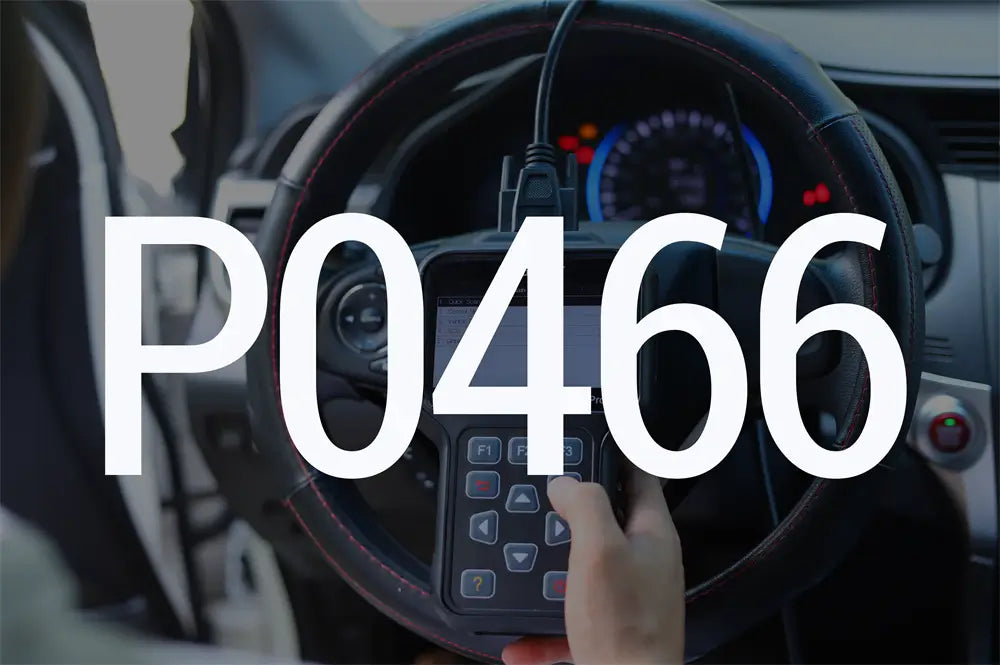Introduction: The EVAP Mystery Behind the Check Engine Light
You’re driving along when the dreaded check engine light flickers on. A quick OBD2 scan reveals: P0446. Panic? Not yet. While the code might sound cryptic, it typically points to a manageable issue. In this guide, we’ll break down what the P0446 code means, what causes it, how it affects your car, and how to fix it. Whether you're a DIY car enthusiast or simply want to understand what your mechanic is talking about, this blog offers a complete roadmap for handling P0446 efficiently and cost-effectively.
1. What Does P0446 Mean?
The P0446 code stands for "Evaporative Emission Control System Vent Control Circuit Malfunction." In simpler terms, it means your car’s computer has detected a problem with the EVAP system’s vent valve or its circuit. This system is responsible for trapping fuel vapors from your gas tank and preventing them from escaping into the air. The vent valve helps regulate airflow into the charcoal canister where vapors are stored.
A malfunction could mean the valve is stuck open or closed, or there's a wiring issue preventing the system from working properly. While not immediately dangerous, P0446 should be addressed soon to avoid failing emissions tests or causing further damage.
2. Common P0446 Symptoms
P0446 can be sneaky—many vehicles don’t exhibit any driveability issues. Still, here are signs to watch for:
-
Check Engine Light (CEL): The most common and often only noticeable symptom.
-
Fuel Odor: Especially around the vehicle after filling up, possibly due to vapor leaks.
-
Decreased Fuel Economy: Less common, but can result from improper EVAP system function.
-
Failed Emissions Test: Vehicles with this code will likely fail smog checks.
-
Rough Idle or Stalling (rare): If the EVAP issue affects overall engine vacuum.
3. Causes of P0446: What’s Going Wrong?
Diagnosing P0446 can be tricky because it doesn’t point to a single broken part. The most common causes include:
-
Faulty EVAP Canister Vent Valve (Solenoid)
-
Clogged or Damaged Charcoal Canister
-
Wiring Issues: Corroded, frayed, or broken wires/connectors in the vent valve circuit.
-
Faulty Fuel Tank Pressure Sensor
-
Stuck Open EVAP Purge Valve
-
Loose or Missing Gas Cap
-
Dust Intrusion in the Vent Line: Common in trucks driven in dusty areas.
Some manufacturers even issue Technical Service Bulletins (TSBs) because P0446 tends to occur frequently in specific models like the Chevy Silverado or Toyota Camry.
4. Diagnosing P0446: DIY and Professional Methods
A. DIY Troubleshooting Steps
-
Check the Gas Cap: Make sure it's tight and not cracked. Replace it if unsure.
-
Visual Inspection: Look for damaged wires, cracked hoses, or a loose charcoal canister.
-
Listen for Hissing: Can indicate vapor leaks.
B. Using an OBD2 Scanner
An advanced scan tool can:
-
Read P0446 and related codes (P0441, P0442, P0455, etc.)
-
Trigger bi-directional tests to open/close valves
-
Display live EVAP system data
C. Advanced Diagnostics (Professional Shop)
-
Smoke Machine Test: Fills the EVAP system with smoke to reveal leaks.
-
Multimeter Testing: Checks voltages/resistance on the vent valve and purge valve.
-
Vacuum Gauge Test: Measures system pressure changes.
5. How to Fix P0446 (DIY and Shop Options)
Common Fixes Include:
-
Replace EVAP Canister Vent Valve ($100–$200)
-
Repair or Replace Wiring Harness ($50–$150)
-
Replace Charcoal Canister ($300–$600 depending on make/model)
-
Replace Fuel Tank Pressure Sensor ($200–$400)
-
Replace Fuel Cap (Cheap DIY fix: $10–$30)
When to See a Mechanic
If your scan tool doesn't support bi-directional EVAP tests or if you've replaced the gas cap and still get the code, a certified mechanic can do a deeper system test. Consider it especially if you're seeing multiple codes or the car fails emissions.
6. Vehicle-Specific P0446 Issues
General Motors (Chevy Silverado, GMC Sierra)
-
Dust can clog the vent valve.
-
Known issues with Connector C408 corroding.
Toyota (Camry, Corolla, Lexus)
-
Frequent VSV (vacuum switching valve) failure.
-
High cost of replacing entire canister assemblies.
Ford (F-150)
-
Rodents or corrosion often damage EVAP wiring.
-
Moisture-sensitive connectors.
Honda (Civic, Accord)
-
Compact canister designs prone to failure.
7. Cost to Repair P0446
| Component | Parts Cost | Labor Cost | Total Cost Estimate |
|---|---|---|---|
| EVAP Canister Vent Valve | $75–$125 | $50–$100 | $125–$225 |
| Charcoal Canister | $300–$400 | $100–$200 | $400–$600 |
| Wiring Repair | Varies | Varies | $50–$150+ |
| Fuel Tank Pressure Sensor | $100–$200 | $100–$200 | $200–$400 |
| Gas Cap Replacement | $10–$30 | Free (DIY) | $10–$30 |
8. Preventing P0446: Long-Term Tips
-
Don’t Overfill Your Tank: Topping off can flood the charcoal canister.
-
Regular Visual Inspections: Check hoses and wiring for wear or animal damage.
-
Tighten Fuel Cap Every Time: It's easy to forget, but essential.
-
Avoid Dusty Roads When Possible: Or install dust shields for protection.
-
Address Codes Early: Don’t let minor EVAP issues evolve into costly repairs.
Final Thoughts: Don’t Ignore P0446
While P0446 may not stop your vehicle dead in its tracks, ignoring it could lead to failed emissions tests and more complex EVAP system damage. Understanding what the code means—and how to fix it—can save you money, reduce emissions, and keep your car in top shape.
Whether you choose to DIY with a trusted scan tool or consult a professional mechanic, taking early action on a P0446 trouble code ensures long-term reliability. And as you now know, not all check engine lights are created equal—some just require a bit of charcoal canister TLC.
Ready to clear that code? Start with the basics, and drive on with confidence.

